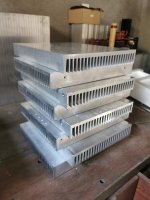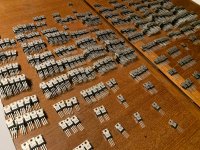I got a message about the Q4/Q5 on old vs. new boards. Since a picture is worth 1000 words, I hope this is helpful.

Last edited:
You could look at aleph 2. 45V rails at 3AHeat sinks ready to dissipate some serious heat. Tests showed that can dissipate around 280-300W per channel.
Anyone have an idea how high can i go with power supply voltage on Aleph 60 not to change schematic values?
Last edited:
Yes, Aleph 2 is nice, but i have almost all parts for A60 now. I know, no big difference.
The plan was to build normal Aleph 60 with slightly higher bias, but now i have those nice big heat sinks and i would like to rise a voltage a bit.
I tried Aleph 30 with high bias and it sound better on most speakers.
The plan was to build normal Aleph 60 with slightly higher bias, but now i have those nice big heat sinks and i would like to rise a voltage a bit.
I tried Aleph 30 with high bias and it sound better on most speakers.
Hi guys. Finally getting a bit further with my Randy Raffle boards. Got one powered up this afternoon after waiting for washers and thermal compound.
Initial test with GBPC2502 gave about 17.3v and hot rectifiers dangling in mid air. Swapped out to some LT4320 and now have 19.3v or so. From a 500va 18v Toroidy through a Capmx. Just a psu I had on hand to test. Maybe I will use it.
Measured for bias current and getting approx 0.43v over the big resistors. Quick maths means 0.9A....multiply by 3 I assume and I'm on 2.7A . Too much so I need to adjust P3. Does it react fast to turning the trimmer, as in I can't suddenly go too far the wrong way and cook something.?!
Letting it cool whilst I write this. Heatsink was getting toasty but manageable.

Initial test with GBPC2502 gave about 17.3v and hot rectifiers dangling in mid air. Swapped out to some LT4320 and now have 19.3v or so. From a 500va 18v Toroidy through a Capmx. Just a psu I had on hand to test. Maybe I will use it.
Measured for bias current and getting approx 0.43v over the big resistors. Quick maths means 0.9A....multiply by 3 I assume and I'm on 2.7A . Too much so I need to adjust P3. Does it react fast to turning the trimmer, as in I can't suddenly go too far the wrong way and cook something.?!
Letting it cool whilst I write this. Heatsink was getting toasty but manageable.
Edit to the above.....trimmed back to 330mv for 2.1A . Think these sinks are marginal but hopefully when I add some mass with thick front and rear and base I will be ok. Measuring 50+ in certain places.
Capmx needs more sinking too. This is running 'half tilt' I think with me using just 2 of the 4 outputs and the 10x 100x160 ally plate is 50 odd degrees too. Admittedly it is sat face down but I think I would need that finned sink.
Maybe time to rethink the Capmx!

Capmx needs more sinking too. This is running 'half tilt' I think with me using just 2 of the 4 outputs and the 10x 100x160 ally plate is 50 odd degrees too. Admittedly it is sat face down but I think I would need that finned sink.
Maybe time to rethink the Capmx!
Last edited:
This capmx has 4 outputs2 pos and 2 neg, but just this test with one channel I just use 2 outputs....1 x pos 1 x neg.
Jim, this Cap MX looks familiar to me. Looks like the one designed by Juma, with PCB layout made by forum member Prasi.Initial test with GBPC2502 gave about 17.3v and hot rectifiers dangling in mid air. Swapped out to some LT4320 and now have 19.3v or so. From a 500va 18v Toroidy through a Capmx. Just a psu I had on hand to test. Maybe I will use it.
I have build a later version (circuit by Mark Johnson and Gtose) of this when I wanted to lower the rail voltage of my M2x to be able to run at a higher bias with a heatsink that was not capable. But Aleph 30 draws two times the current of an M2x. So the Cap MX runs very hot: ~ 4,5V times 2,3A per rail = 10W dissipation per Transistor = 40W total dissipation for the cap MX when operating two Aleph 30 channels. I guess the big capacitor also gets well warm, maybe even hot.
The cap mx might not be the best thing to use with Aleph 30. With your rail voltage of +/- 18V and 2.1A idle current you will only achieve 14W into 8 ohms:
I can really recommend the power supply that Randy offers in his group buy. It's kind of an improved version of the diyaudio Universal PSU. The charging currents of the rectifiers is spread on more capacitors, so the caps don't get as warm as with the cap mx.
In my build I used the diyaudio store "Universal PSU", build with big 63V rated capacitors. They dont warm up very much, no matter how long the amp is turned on with closed lid. With a 400VA transformer and cheap rectifier bridges I reach +/- 22.3V after warm-up time. That gives me 23W into 8 ohms (as per spreadsheet calculation).
Regarding your heatsinks: I also used silver heatsinks for my first experimental builds, but they have downsides. If you have no convection (air flowing through the fins) then your heatsink needs to let go the heat only by radiation. For certain reasons black anodised aluminium has the best capabilities to transfer heat by radiation. Way better then silver, non anodised aluminium.Letting it cool whilst I write this. Heatsink was getting toasty but manageable.
Black aluminium offers an emissivity factor of 0.9 while natural, non anodized aluminiums value is 0.05
So if you want to continue to use your natural aluminium heatsinks you need ventilation or forced air flow through a fan.
https://www.soselectronic.com/artic...ich-heatsink-surface-treatment-to-choose-2050
Thankyou for those replies. It would seem the capmx may not be suitable. I do have the 'new F5' type as provided by Randy. I suppose I was trying to avoid buying 8 big caps!
The emissivity is something I have read quite a bit about. I was tempted to coat them with a thin kayer of VHT, that then gets cooked in thr oven to cure and bond to the aluminium. I am unsure whether this helps emissivity due to the colour and texture change or if it hinders it by adding a layer that keeps the heat in. The thinking on this seems unclear. I may test the theory on a smaller heatsink and application.
Thanks again. Looks like I'll be building a CRC!
The emissivity is something I have read quite a bit about. I was tempted to coat them with a thin kayer of VHT, that then gets cooked in thr oven to cure and bond to the aluminium. I am unsure whether this helps emissivity due to the colour and texture change or if it hinders it by adding a layer that keeps the heat in. The thinking on this seems unclear. I may test the theory on a smaller heatsink and application.
Thanks again. Looks like I'll be building a CRC!
The conclusion of all this heatsink surface theories might also be to use forced air flow cooling, aka a big slow running fan. Look up for the thread called "babysitter for Papas Koan" - next project I will build.
Read the article I posted above, it says "emissivity factor varies with surface but (forced) convection is way more important to get rid of the heat".
Read the article I posted above, it says "emissivity factor varies with surface but (forced) convection is way more important to get rid of the heat".
For doing the Aleph 60 in one stereo chassis, I'm really going to need the 4U 500, am I not?
And for single-channel monoblocks, I'd need heatsinks on both sides of the block, putting the front end board on one side and the expansion board on the other?
And for single-channel monoblocks, I'd need heatsinks on both sides of the block, putting the front end board on one side and the expansion board on the other?
I think you will need the 2 x monoblock chassis if you want to do the Aleph 60 if my experience is anything to go by. The modushop heatsinks are not very deep finned, and I think even a 5u chassis would struggle to provide enough cooling for a 60. I used a much deeper heataink on mine - 320mm x 340mm with 80mm deep fins on 10mm plate - one big heatsink with both channels on it and it gets to 50degC, or 30deg above ambient. And mine is running at 31V, so I'm getting 50W out of it rather than 60W, which lowers the heat a tad.
I put a note in the Group Buy thread, but I imagine if you have GB#1 boards you're not looking at the GB thread.
I was looking at IRFP9610's on my shelf and realized I don't have enough to cover GB#2. Some folks are going for the FQP3P20's. I still don't have enough with some going for FQP's.
Based on Papa's notes on the Harris parts I bought a lifetime supply of the Harris SFP9610's. Lifetime supply because minimum buy quantity was high. If anyone on GB2 wants to switch to the Harris parts, let me know. No price change. Drop me a note.
Any GB#1 folks want to try a matched set of Harris SFP9610's? Or FQP3P20?
$24 + shipping on me in USA.
$24 + ship outside USA.
I was looking at IRFP9610's on my shelf and realized I don't have enough to cover GB#2. Some folks are going for the FQP3P20's. I still don't have enough with some going for FQP's.
Based on Papa's notes on the Harris parts I bought a lifetime supply of the Harris SFP9610's. Lifetime supply because minimum buy quantity was high. If anyone on GB2 wants to switch to the Harris parts, let me know. No price change. Drop me a note.
Any GB#1 folks want to try a matched set of Harris SFP9610's? Or FQP3P20?
$24 + shipping on me in USA.
$24 + ship outside USA.
Pass DIY Addict
Joined 2000
Paid Member
- Home
- Amplifiers
- Pass Labs
- Classic Aleph Amplifier for Modern UMS Chassis Builder's Thread

